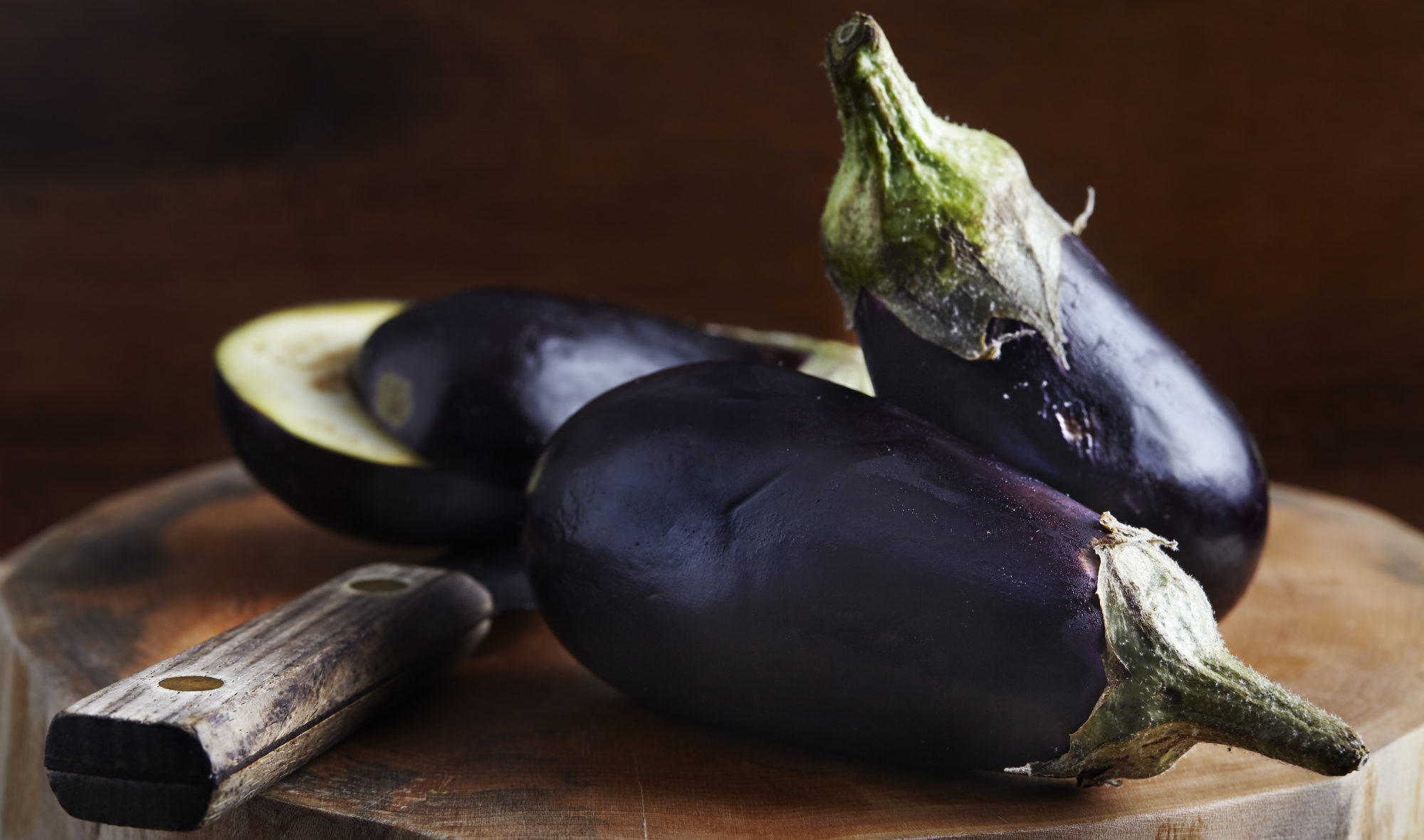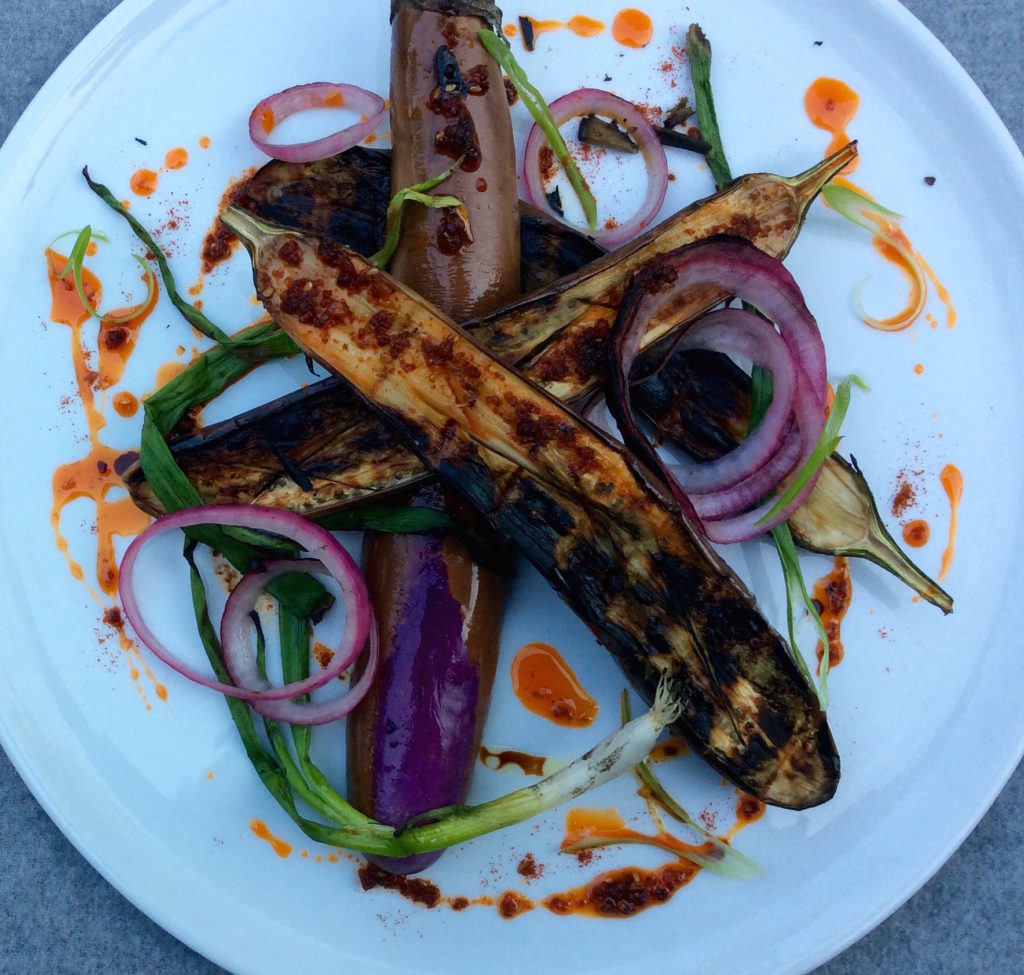Eggplant


Eggplant is a nightshade vegetable that comes into season during the summer months. Aside from its green top, the entire eggplant is edible: its purple skin, its white flesh, and the tiny seeds inside. Eggplant contains protein, fiber, and a wide range of vitamins and minerals as well as some antioxidants. Eggplant should be cooked before eating. Try it roasted, grilled, or as a vegetarian substitute in common meat dishes.
Eggplant is a species of nightshade. It is best available in the summer months, after all risk of frost is past, or year-round in tropical and subtropical climates.
Common varieties of eggplant are oval and/or elongated, with a purple-black hue. The thin, firm rind is smooth and shiny. The inner flesh is white, speckled with tiny seeds.
Globe and Black Beauty are popular varieties usually found in grocery stores. Both of these are deep-purple colored eggplants. But a number of different species also exist in different shades, shapes, and colors. In the summer and early fall, these less common varieties can be sought out at farmers’ markets.
One eggplant (approximately 1 – 1 ¼ lb) contains about 137 calories, 5.37g of protein, 0.99g of fat, 32.22g of carbohydrates, 16.4g of fibre, and 19.34g of sugar.
Eggplant contains a mix of vitamins, including vitamin A, B vitamins, folate, and vitamin C and minerals including potassium, magnesium, and calcium. In addition, eggplant contains some antioxidants: chlorogenic acid and nasunin (which is found in the peels of eggplant).
Look for eggplants that have a bright color and shiny sheen. They should have a gentle give when squeezed but not feel rubbery or limp. Most eggplants should still have a firm, green top attached.
A few wrinkles on the skin can simply mean the eggplant is ripe, but avoid eggplants with significant bruising, cuts or damage to the skin.
Ideally, consume the eggplant within 1 to 3 days of purchase. During this time it may be kept at room temperature, in a cool, dark place. If you prefer to store eggplant in the refrigerator, it may last up to 5 days depending on freshness. Avoid sealing it in a plastic bag.
Eggplant is best cooked. Eaten raw it can taste bitter, but cooking it brings out a rich, savory flavor. (For this reason it is often used as a meat substitute in vegetarian dishes). The small seeds inside the eggplant and the thin skin are all edible.
To prepare the eggplant for cooking, you may choose to peel or score it (make thin, shallow cuts with a knife in the skin).
To cut up the eggplant, start by cutting off the green top. Cut up the eggplant depending on your preference for cooking: cubes are great for sautés, slices work well for roasting, and vertical slices (cut the eggplant in half-inch slice from top to bottom) work well for grilling.
You may choose to salt the eggplant before cooking which will help rid it of extra moisture. This is especially helpful if frying the eggplant. To do this, cut the eggplant according to your preference, then sprinkle the pieces generously with salt. Let them sit for about an hour, during which time you will see water droplets appear. Rinse the salt off the eggplant and dry thoroughly.
No matter the cooking method, eggplant is best when thoroughly cooked. Longer cooking will bring out a creamy texture and ease its bitter flavor.
Note: There are popular eggplant dishes all over the world: ratatouille in France; eggplant parmesan in Italy; baba ghanouj; in Arabic regions; deep fried with tahini in Israel; moussaka in Greece. It is a frequent addition to curries throughout India and Southeast Asia and stir fries in China. In the summertime, grilled eggplant is a great addition to an American BBQ.

Make this recipe to fall in love with eggplant. The textures and flavors of the ingredients come together to create a delightfully tasty dish.
Prep Time: 25 minutes Cook Time: 10 minutes Yield: 4 sides
Place the oil, chile, and ginger in a small pan and cook on low heat until the garlic starts to toast around the edges.
Add the miso, vinegar, and soy to the pan. Cook for another minute. Remove pan from heat.
In a blender, or mortar and pestle, blend until just combined but still chunky.
Turn on the grill or BBQ to medium-high heat. Slice the eggplant lengthwise, score the flesh halfway through with a small knife and season with salt. Slice the red onion, and slice one of the green onions. Set aside.
In a large bowl, toss the eggplant with half the vinaigrette. Grill the eggplant and red onion until nicely charred and fully cooked (about 10 minutes for the eggplant and 4 for the onions). Add the whole green onions at the last minute to wilt and char the ends.
To serve, arrange the eggplants and onions on the plate, drizzle with the remaining vinaigrette, and garnish with the remaining sliced green onion.
Store leftovers in fridge.
Enjoy.
Precision Nutrition’s Encyclopedia of Food expands every single month as we highlight new foods and showcase beautiful food photography. If you’d like to stay up to date, simply click this link. From there, we’ll send you a FREE copy of our recipe book. We’ll also let you know when new and delicious foods are added to the site.
Eggplant is a nightshade vegetable that comes into season during the summer months. Aside from its green top, the entire eggplant is edible: its purple skin, its white flesh, and the tiny seeds inside. Eggplant contains protein, fiber, and a wide range of vitamins and minerals as well as some antioxidants. Eggplant should be cooked before eating. Try it roasted, grilled, or as a vegetarian substitute in common meat dishes.